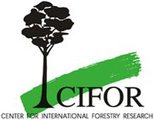The Center for International Forestry Research (CIFOR) released a report on great ape conservation and poverty alleviation.
The report considers REDD+, tourism, human-wildlife conflict, and great ape biology.
 March 2013: The Center for International Forestry Research (CIFOR) has released a report on great ape conservation and poverty alleviation. The report considers REDD+, tourism, human-wildlife conflict, and great ape biology.
March 2013: The Center for International Forestry Research (CIFOR) has released a report on great ape conservation and poverty alleviation. The report considers REDD+, tourism, human-wildlife conflict, and great ape biology.
The report considers great ape conservation in Asia and sub-Saharan Africa, drawing similarities with regards to high levels of rural poverty and common threats to great apes from land use change. The outcomes of the report are based on workshops held in Indonesia and Uganda on great ape conservation, community engagement and income generation.
Main conclusions from the report reveal that conservation can either increase or alleviate poverty depending on how it is implemented. Given the high risk of extinction for the six great ape species, the report urges priority to be given to national and international laws to protect great apes.
The report further explores the potential co-benefits for great apes from REDD+ and suggests the development of associated REDD+ safeguards, multi-stakeholder engagement in REDD+ and attention to REDD+ programmes that extend across national borders.
Other options for benefits for great ape conservation are associated with tourism, as long as tourism benefits are equitably shared. The report notes, however, that tourism may increase human-wildlife conflict. CIFOR is a member of the Consultative Group on International Agricultural Research (CGIAR). [Publication: Linking Great Ape Conservation and Poverty Alleviation Sharing Experiences from Africa and Asia – Info Brief No. 60]